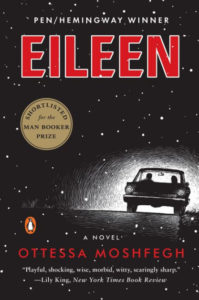 I never used to do it, owing probably to something instilled in my PhD program: there’s always something to learn from this book you might not enjoy. But in the last year I’ve abandoned 4 books:
I never used to do it, owing probably to something instilled in my PhD program: there’s always something to learn from this book you might not enjoy. But in the last year I’ve abandoned 4 books:
- How to Grow Up, by Michelle Tea
- Paul Takes the Form of a Mortal Girl, by Andrea Lawlor
- A Brief History of 7 Killings, by Marlon James
- My Struggle, Book 6, by Karl Ove Knausgaard
The Tea book was, it gradually dawned on me, not written for a 40yo man with a job as a tenured professor. (Michelle Tea fans are now laughing at me, which laughter I accept.) The Lawlor book, about a shapeshifting queer kid living in Iowa City, was remarkable and did some incredible things with gender performance and story structure, but it was also about 80 percent “hanging out at bars” and I couldn’t get engaged in the book as anything other than a remarkable tour de force.
Same with the James novel. It won the Booker Prize, it was a queer writer, everyone who I told I was reading it raved about the book. It is a wonder of voice and character and point of view, a marvel, jaw-dropping at times in how well done it is, and though I gave it 200 pages, waiting for the story to kick into a forward momentum, it never did, or didn’t enough for this reader, and I set it aside.
I used to worry that if I didn’t like an award-winning book, or a book that the majority of my friends liked, there was something wrong with me. I asked myself if, by not finishing these books, if I was, at worst, racist or sexist or transphobic, or, at best, just stubborn about engaging with novels about people from different backgrounds than me.
Then I picked up the Knausgaard, having read gleefully through the first 5 volumes. That’s 2500 pages of reading time I devoted. Again: gleefully. I won’t get into why I loved the books so much, because the point here is that I couldn’t bear Volume 6, which deals mostly with the publication of the book’s first volume. I gave it 200 pages again, and once Karl Ove and his friend start talking about fascism and Hitler, I flipped forward and saw this was going to go on for a while, and I put it away.
Once, this would have been anathema to me. If I got 100 pages into a novel, I couldn’t bear not to finish it, just because of all the labor I’d put in. The idea of not completing this 6-volume novel now feels like a relief. Oh. I don’t have to read this if I don’t enjoy it. As much as I love books about ideas, I realized what I couldn’t bear this time was forcing myself to listen to two middle-aged men talk about Nazis.
Am I trying to get at a feeling I have that I know myself better than I used to? Surely I now find myself saying things like “That book wasn’t for me” more than “That’s not a good book,” which I used to say a lot. I no longer have the confidence to say what is and isn’t a good book, but I have more confidence to say what I like in a book, or what I need or am looking for.
It’s a kind of growing up.
What I’m reading now is Eileen, by Ottessa Moshfegh, and it is perfect. It’s a perfect novel that strangely has very little forward momentum, but what holds me close is this voice of her misanthropic protagonist, full of hope but bereft of motivation. She’s strong with desire and full of hatred toward, and sickness about, her body. I don’t know why she’s exactly what I need right now, I just know that she is. I’m so glad for this book’s landing in my life.
One of your abandoned books is one you assigned me for Thesis!!!! 🤣
I know. And wasn’t it a good and useful book for you?
I relate so much! My friend Alvin Orloff used to say “That’s not marketed to me,” which I found very elegant. And seriously, thank you for your very kind words. This is the nicest DNF ever! xo AL